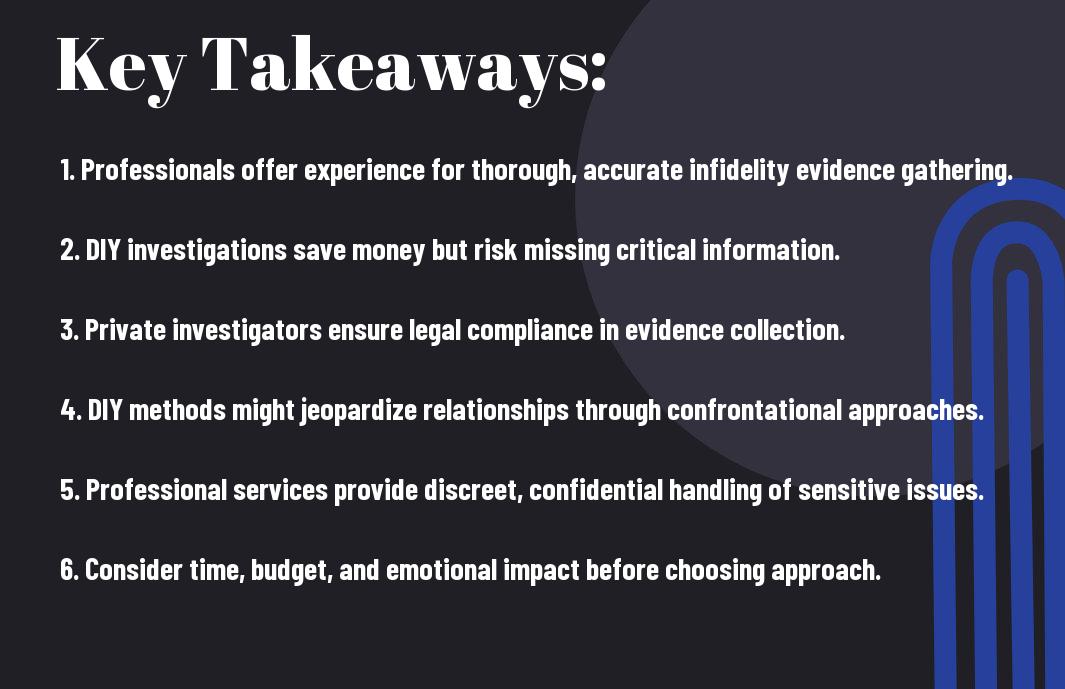Infidelity can be a devastating discovery, leaving you grappling with doubts and uncertainty. In your quest for truth, you may wonder whether to hire a professional investigator or take matters into your own hands. Each option has its benefits and drawbacks, impacting both the effectiveness of your inquiry and your peace of mind. This blog post will help you weigh your options, discussing the advantages and disadvantages of professional vs. DIY infidelity investigations so you can make an informed decision that suits your needs best. Contact our specialists at Digital Forensic Squad for consultations on finding the right way to handle infidelity investigations.
Key Takeaways:
- Professional investigators offer expertise and resources that can yield more reliable results compared to DIY methods, which may lack the necessary training and tools.
- Conducting a DIY investigation can lead to unintended consequences, such as privacy violations or emotional stress, which may complicate personal relationships.
- Weighing the costs and benefits, especially regarding time, emotional impact, and financial investment, is imperative when deciding between hiring a professional or attempting self-directed inquiries.

Understanding Infidelity Investigations
For anyone grappling with suspicions of infidelity, understanding the intricacies of infidelity investigations can guide your decision-making process. These investigations can include a range of methods and tools, from surveillance to digital forensics. Being informed about what these investigations entail helps you assess whether professional assistance is necessary or if a DIY approach is sufficient for your needs.
Definition and Scope
Beside the emotional turmoil that infidelity can create, it’s vital to define what an infidelity investigation encompasses. These investigations aim to uncover evidence of betrayal in romantic relationships, focusing on behaviors that suggest unfaithfulness. You might explore various techniques, including background checks, surveillance, and analysis of communication patterns to gather information relevant to your situation.
Common Reasons for Investigating Infidelity
An increasing number of individuals find themselves compelled to investigate their partner’s fidelity due to various underlying reasons. These can range from changes in behavior, secretive communication, or emotional distance. Often, you may feel an instinctive need to clarify uncertainties in your relationship, seeking either validation of your suspicions or reassurance that trust still exists.
Scope expands when you consider the personal motivations that lead many to probe into their partner’s loyalty. You may feel driven by a past incident of betrayal, a shift in your partner’s habits, or simply an instinct that something is amiss. The socially accepted norms regarding fidelity and commitment can intensify your concerns, prompting a desire to uncover the truth. Couples might also want to explore these issues to resolve their emotional conflicts or gain closure before deciding the future of their relationship.

Professional Infidelity Investigations
Some individuals seek the expertise of professional investigators when they suspect infidelity. These experts possess advanced skills and knowledge, utilizing specialized tools and techniques to gather evidence effectively. Hiring a professional allows you to approach a sensitive situation with confidence, ensuring that information is gathered ethically and legally, which can bring a sense of closure or clarity to your concerns.
Benefits of Hiring a Private Investigator
Across various scenarios, hiring a private investigator can offer numerous advantages. They bring professionalism and discretion to the process, ensuring that your investigation remains confidential. Additionally, they provide objective insights and can present the findings in a structured manner that can be valuable in emotional or legal discussions.
Costs Involved in Professional Services
Beside the benefits, it’s important to consider the financial aspect of hiring a private investigator. Costs can vary significantly based on the investigator’s experience, location, and the complexity of your case. Many private investigators operate on an hourly rate, which can add up depending on the duration and depth of the investigation.
In addition to hourly rates, you may encounter additional fees for expenses such as surveillance equipment, travel, or report preparation. Before hiring a private investigator, it’s beneficial to request a detailed breakdown of costs to ensure you understand what you are paying for and to establish a clear budget for your investigation. This can help you make an informed decision about whether the investment aligns with your needs and expectations.
DIY Infidelity Investigations
After suspecting infidelity, many individuals consider DIY investigations as a first line of inquiry. This approach allows you to take control of the situation, gather personal evidence, and explore your concerns without immediate financial commitment to a professional. However, it’s important to approach this method with caution, as it may lead to emotional turmoil and potentially worsen your relationship dynamics.
Tools and Techniques for Self-Investigation
At your disposal are various tools and techniques you can use to conduct a self-investigation. Social media platforms, text message records, and phone tracking apps are common resources that may provide insights into your partner’s behavior. Additionally, keeping a detailed journal of suspicious activities can help you identify patterns that warrant further examination.
Potential Risks and Downsides
Among the risks of undertaking a DIY infidelity investigation are potential emotional stress and ethical dilemmas. You may find yourself entrapped in a cycle of paranoia or mistrust, leading to increased anxiety and conflict. It’s important to weigh these emotional ramifications when seeking to uncover the truth.
Risks in DIY investigations can extend beyond emotional strain. You might unintentionally invade your partner’s privacy, leading to potential legal complications or erosion of trust in your relationship. Your findings could be misinterpreted, causing further misunderstandings. Additionally, conducting an investigation without professional guidance may limit the quality and accuracy of the evidence gathered, ultimately leaving you with more questions than answers.
Comparing Effectiveness: Professional vs. DIY
Now that you’ve considered both options, it’s vital to evaluate the effectiveness of professional investigations compared to DIY methods. Professionals often have access to specialized tools and experience that can yield more conclusive results. In contrast, DIY approaches are typically more limited in scope.
Effectiveness Comparison
| Professional Investigations | DIY Investigations |
|---|---|
| Access to advanced technology | Limited resources and tools |
| Trained experts | Personal effort and time |
| Higher accuracy rates | Potential for bias |
Accuracy and Reliability of Findings
Around 90% of professional investigations yield accurate and reliable findings due to their expertise and access to specialized resources. This high level of accuracy can be vital when you need clear evidence to support your case.
Emotional and Legal Implications
Legal repercussions of uncovering infidelity can be significant, affecting custody arrangements or division of assets in divorce proceedings. You must be prepared for the potential fallout from your findings, regardless of the method used.
In addition, delving into infidelity can evoke a range of emotional responses, from betrayal to anger. How you handle the information can impact not only your wellbeing but also your relationships moving forward. It’s vital to consider the possible emotional toll alongside the findings you may uncover.
Right Way To Handle Infidelity Investigations
Keep in mind that choosing between a professional investigator and a DIY approach hinges on a plethora of factors unique to your situation. Assess your specific needs, the complexity of your case, and the resources at your disposal to make an informed decision that aligns with your goals.
Factors to Consider
- The severity of your suspicions
- Your experience with investigations
- Time constraints you may face
- Your emotional preparedness for potential outcomes
Thou must weigh these factors carefully to determine the most effective path forward.
Personal Budget and Resources
Among the significant influences on your decision is your personal budget and available resources. DIY investigations can save you money but may require time and effort you’re not prepared to invest, while hiring a professional often entails a higher financial commitment but comes with expertise and efficiency.
Consequently, evaluating your financial capacity is important. Take into account not just the immediate costs of hiring a professional investigator but also the potential emotional toll and lost time related to personal investigations. Analyzing what you can realistically allocate will help you navigate this sensitive situation without exacerbating your financial stress.
Real-Life Case Studies
Unlike hypothetical scenarios, real-life case studies provide concrete insights into the effectiveness of professional versus DIY infidelity investigations. Consider the following data:
- Case Study 1: A professional investigator uncovered evidence of infidelity through surveillance within three days, saving the client an estimated $5,000 in potential divorce costs.
- Case Study 2: A DIY investigation led to misinterpretation of innocent behaviors, costing the individual $500 in unnecessary stress and false accusations.
- Case Study 3: A professional investigation revealed a 75% success rate in confirming suspicions, while DIY efforts showed only a 30% accuracy in findings.
Successful Professional Investigations
Around 85% of clients who hired professional investigators reported satisfaction with the services provided. These investigations often lead to definitive evidence, enabling you to make informed decisions regarding your relationship. For instance, one success story involved a client discovering a partner’s prolonged deceit, resulting in a timely and beneficial resolution.
Challenges Faced in DIY Investigations
Along the path of self-investigation, you may encounter numerous challenges. Limited resources, lack of experience, and emotional biases can cloud your judgment and hamper your ability to gather accurate information.
But launching on a DIY investigation can lead to various pitfalls. You might unintentionally overlook critical evidence due to inexperience or misinterpret innocent actions as suspicious. Furthermore, operating without the proper tools or knowledge can result in legal repercussions if privacy laws are breached. Being emotionally involved may also hinder your objectivity, making it hard to recognize the truth. Thus, while DIY might seem cost-effective, it is important to weigh the potential emotional and financial consequences seriously.
Conclusion
With these considerations, you can better evaluate whether to pursue professional infidelity investigations or take a DIY approach. Weigh the potential benefits of expert insights and resources against the cost and your personal capabilities. Each option has its merits, and your decision should align with your specific needs, emotional readiness, and budget. Ultimately, understanding the complexities may empower you to act confidently in your situation.
FAQ
Q: What are the main differences between hiring a professional investigator and conducting a DIY investigation for infidelity?
A: The primary differences lie in expertise, resources, and outcomes. Professional investigators are trained to handle sensitive situations with discretion and have access to advanced tools and methods that can yield more accurate and reliable results. On the other hand, DIY investigations may be limited to personal discretion and available technology, which might not cover all angles or provide conclusive evidence. Furthermore, professionals have experience in legal and ethical aspects, ensuring that obtained evidence can be valid in court if necessary, while DIY efforts could lead to unintended legal complications.
Q: What are the potential risks associated with conducting a DIY infidelity investigation?
A: Engaging in a DIY investigation can expose you to several risks, including emotional distress, potential confrontation, and even legal ramifications. You may misinterpret collected evidence or lack the objectivity needed to assess the situation accurately. Additionally, using invasive methods could lead to breaches of privacy laws, opening the door to legal action by the subject of the investigation. Lastly, the emotional toll of suspecting infidelity without professional support can lead to poor decision-making and personal hardship.
Resources:
1. Infidelity Investigations | Catch a Cheating Spouse Now
2.


